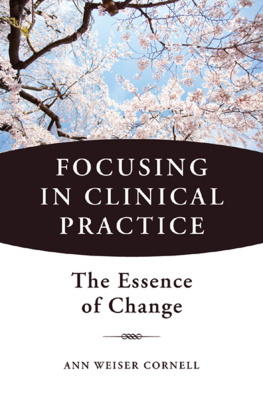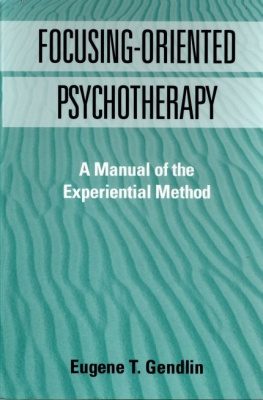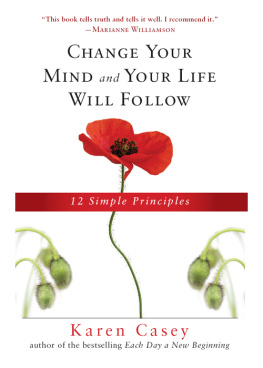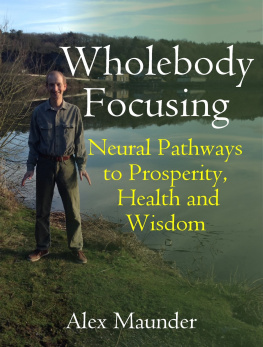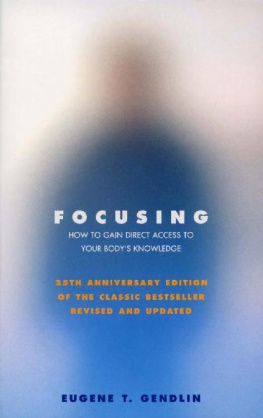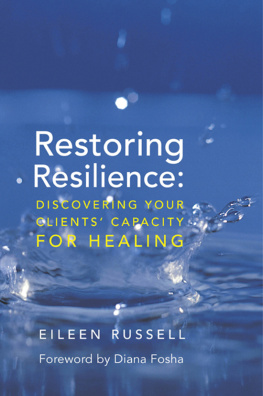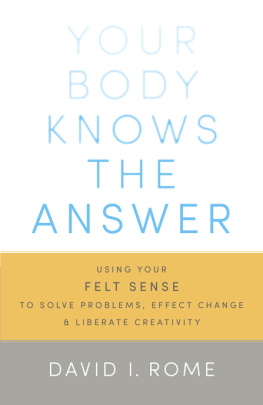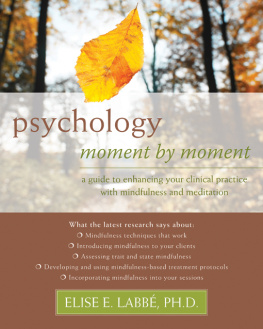
A ONE-PAGER TO SUPPORT CLIENTS IN USING PRESENCE LANGUAGE AT HOME
Overwhelmed? Sometimes we get identified with how we are feeling at a given moment. Our minds and bodies are carrying stress, upsetting events, choices we might be struggling to make, and so on. Maybe we cant think well and feel on the verge of tears, on edge, or like we might lose our temper at any moment. When we are identified with a part of ourselves, we can experience great difficulty bringing ourselves to the present moment, where we might otherwise feel calmer, clearer, and able to function at a more optimal level. The following is from Inner Relationship Focusing, a mind-body relational process, created by Ann Weiser Cornell, PhD, and Barbara McGavin.
Presence Language
Notice the differences between these sentences:
1. I feel so frustrated by what she did.
2. Something in me feels so frustrated by what she did.
3. I am sensing something in me that feels so frustrated by what she did.
Do you feel a difference?
Your turn:
1. I feel {... }.
2. Something in me feels {... }.
3. I am sensing something in me that feels {... }.
After you shift your language, notice what difference it made.
SELF-FOCUSING CUE CARD
Coming In
Im taking time to sense into my body, first the outer areas, then throat, chest, belly, and so on.
What wants my awareness now [about that issue]?
Making Contact
Im sensing something...
Im acknowledging this something.
Im sensing how it would like me to be with it.
Im finding the best way to describe it.
Im checking the description with my body.
Deepening Contact
Im sensing if its okay to just be with this.
Im sitting with it, with interested curiosity.
Im sensing how itfeels from its point of view.
Im sensing if it has its own emotion or mood.
Im letting it know I hear it.
Im open to any more it wants to let me know.
Coming Out
Im letting it know its time to stop soon.
Im letting it know Im willing to be back.
Im thanking my body and my bodys process.
If you get into a heated discussion with a family member, notice afterward how you feel.
If you get frustrated with yourself while doing a project, pause to sense how youre feeling.
If you are lying awake at night worrying about money, notice the feelings youre having.
Then say: I am sensing something in me feels... and notice what changes.
Adapted from a client handout created by Carol Nickerson, LCSW.
From the Focusing Training Program, Focusing Resources Inc., http://www.focusingresources.com.

Many people helped me with conversations about their work with clients and their views on therapy, including Michelle Bendowski, Karin Bundschuh-Mller, Frans Depestele, Nancy Eaton, Lakme Batya Elior, Glenn Fleisch, Ken Frank, Elena Frezza, Mary C. Howard, Carol Ivan, Joan Lavender, Karen Levin, Bret Lyon, Noga Maivar, Dave Potter, Jane Quayle, Elke Schaettgen, and Susan Stephens. Elmar Kruithoff deserves a special mention. I am eternally grateful to the Focusing Institute, without whose existence I might never have met most of these special people, and to the whole Focusing community.
I had a team of close discussants who were willing to talk to me regularly and comment on early drafts: Helene Brenner, Shulamit Day, Elmar Kruithoff, Larry Letich, Lauren Mari-Navarro, and especially Carol Nickerson, whose weekly conversations with me about the book were a source of great support.
I also benefited from conversations with fellow authors and noted theorists: John Amodeo, Helene G. Brenner, Robert Elliott, Diana Fosha, Eugene Gendlin, Mike Hellwig, Sue Johnson, Lynn Preston, and Margaret S. Warner.
Lauren Mari-Navarro, Kevin Sachs, and Judy Schavrien each read the manuscript and helped me catch mistakes and speak in a clearer voice. Their help was invaluable. The mistakes that remain are all mine.
My boundless gratitude and appreciation go to my brilliant and creative staff, Shannon Crossman, Brittany Dean, and Maggie Hurley, who make it possible for me to have both a business and a life, and Elizabeth Kaye, my Focusing-oriented leadership coach.
I bless the fabulous baristas at Philz Coffee in North Berkeley: Andie, Angela, Anna, Anthony, Bijan, Caroline, Catherine, Celsa, Christian, Daniel, Darren, two Dereks, Dylan, Eric, Ilya, Jamie, Kate, Kathryn, Katie, Kyle, Lucky, Petra, Rachel, Sadie, Samantha, Tess, Zachsorry if I missed someone! You knew my name, remembered my goat milk, and made it possible to write this book in a great atmosphere.
Im grateful to my book-writing software for the Mac: Scrivener, by Literature & Latte, which allows the ducks to be put in a nice neat row.
My appreciation to my editor at Norton, Andrea Costella Dawson, who had the idea for this book and never wavered in her vision of a concise road map to Focusing for clinicians.
My working partnership with Barbara McGavin illuminates my life and has built a place to stand, to reach beyond where I ever could have reached alone.
Gene Gendlin, I can never say enough about what your life and being have meant to me.
Finally, my undying thanks to my daughter Mika, my nieces Corinne and Nicole, and my nephews, Christopher, Jon, Josh, and Kip, who are a constant source of delight and great pride, and Joe McBride, cheerleader, in-house editor, and soulmate, whose abundant love and generous good humor have never failed me.
Ann Weiser Cornell
Now that mindfulness and somatic approaches are the rage in psychotherapy, it is important to appreciate that they arose, at least in part, from Eugene Gendlins Focusing . In this engaging and scholarly book, Ann Weiser Cornell provides a deeper understanding of the Focusing process and explains how to usefully integrate it into many other therapy approaches.
Richard Schwartz, PhD,
developer of Internal Family Systems Therapy
An instant classic. Read it. And then read it again. Ann Weiser Cornell has written a masterpiecewith ease, conviction, clarity, and natural grace, she makes a huge contribution by clearly articulating specific aspects of what it means to use Focusing in clinical practice, and how to do so in a way that rings true to clinicians. As she promises in the subtitle, this book deepens our understanding of the essence of change. Kudos!
Diana Fosha, PhD, developer of AEDP,
author of The Transforming Power of Affect (2000),
and co-editor of The Healing Power of Emotion:
Affective Neuroscience, Development & Clinical Process (2009)

Focusing is a particular process of attention that supports therapeutic change, a process that has been linked in more than 50 research studies with successful outcomes in psychotherapy (Hendricks, 2001). Facilitating Focusing in our clients can enable natural and adaptive change in body, mind, and behavior. The rest of this book offers practical support in bringing Focusing into your clinical practice, no matter what modality of psychotherapy you follow. But first, well have a look in this chapter at what sets Focusing apart, what makes it unique, what gives Focusing its particular power. To do so, I will give an example of Focusing and then introduce some new concepts for understanding the process of change.
What change is, and what brings change, are key questions for all clinicians. Our clients come to us faced with life situations that feel burdensome and unshiftable, struggling with emotional states that are sometimes out of control and frightening in themselves. They have anxiety, or flashbacks to traumatic memories, or they are shut down, hemmed in by defenses that have been their best way of getting by until now. They may be finding some measure of relief in addictive or obsessive behaviors that nevertheless are problems in themselves. Their lives may be mostly on an even keel except for one troublesome area that somehow underlies the whole system, or they may feel close to a frightening disintegration, hanging on by their fingernails. Some may experience emotional overwhelm, others a puzzling lack of emotion, and others a persistent sense of worthlessness and shame, dogged by an inner critic. Some are quite self-aware and able to talk at length about their own contributions to their issues, while others arent even sure they have a problem at all, as in: My spouse wanted me to see you....
Next page
